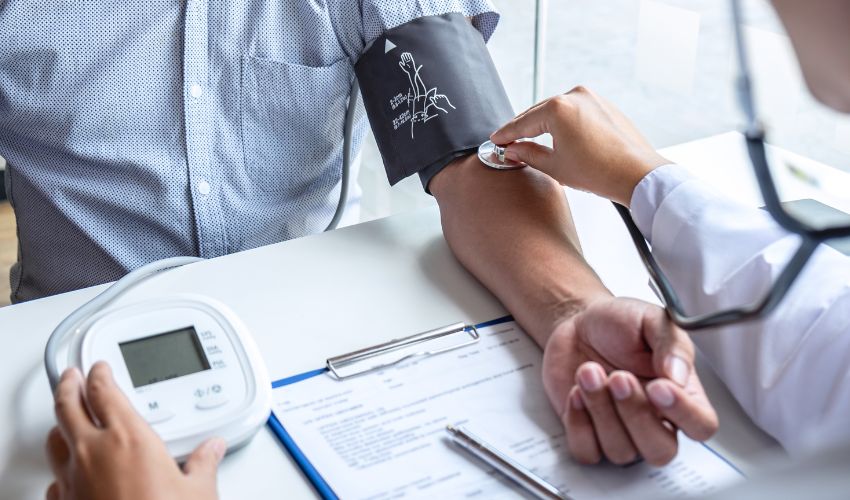High blood pressure, also known as hypertension, is a common medical condition that affects millions of people worldwide. This condition is caused when the force of blood flowing through your blood vessels is consistently too high. If left untreated, high blood pressure can lead to serious health problems like heart attack, stroke, and kidney disease. In this article, we will explore the causes, symptoms, and treatment options for high blood pressure.
Causes of High Blood Pressure:
There are several factors that can contribute to high blood pressure. Some of these factors include:
- Family history of high blood pressure
- Age
- Being overweight or obese
- Lack of physical activity
- Smoking
- Excessive alcohol consumption
- Stress
- Certain medications like birth control pills, cold remedies, and decongestants
Symptoms of High Blood Pressure:
In most cases, high blood pressure does not cause any symptoms. That’s why it’s often referred to as the “silent killer”. However, some people may experience the following symptoms:
- Headaches
- Shortness of breath
- Dizziness
- Blurred vision
- Chest pain
If you experience any of these symptoms, it’s important to seek medical attention right away.

Diagnosing High Blood Pressure:
High blood pressure can be diagnosed by a doctor or healthcare provider through a blood pressure reading. A blood pressure reading consists of two numbers – the top number (systolic pressure) and the bottom number (diastolic pressure). A reading of 120/80 mmHg or lower is considered normal, while a reading above 140/90 mmHg is considered high.
Treatment for High Blood Pressure:
If you are diagnosed with high blood pressure, your doctor may recommend one or more of the following treatment options:
- Lifestyle changes – this may include losing weight, quitting smoking, reducing alcohol consumption, and increasing physical activity.
- Medications – there are several types of medications that can be prescribed to lower blood pressure, including diuretics, ACE inhibitors, and calcium channel blockers.
- Surgery – in some cases, surgery may be necessary to treat high blood pressure.
FAQs:
Can high blood pressure be prevented?
Yes, high blood pressure can be prevented by making healthy lifestyle choices like eating a balanced diet, exercising regularly, quitting smoking, and reducing alcohol consumption.
Is high blood pressure hereditary?
Yes, high blood pressure can be hereditary. If you have a family history of high blood pressure, you may be at an increased risk of developing the condition.

Can stress cause high blood pressure?
Yes, stress can cause temporary increases in blood pressure. However, it is not a long-term cause of high blood pressure.
Can high blood pressure be cured?
High blood pressure cannot be cured, but it can be managed through lifestyle changes and medication.
What are the complications of untreated high blood pressure?
Untreated high blood pressure can lead to serious health problems like heart attack, stroke, and kidney disease.
Conclusion:
High blood pressure is a serious medical condition that affects millions of people worldwide. While there are several factors that can contribute to this condition, it can be managed through lifestyle changes and medication. If you think you may have high blood pressure, it’s important to seek medical attention right away. By taking care of your health and making healthy lifestyle choices, you can prevent high blood pressure and lead a healthy life.
In conclusion, high blood pressure is a condition that should not be taken lightly. It can have serious consequences if left untreated. It’s important to maintain a healthy lifestyle, including a balanced diet, regular exercise, and avoiding harmful habits like smoking and excessive alcohol consumption. If you have been diagnosed with high blood pressure, following your doctor’s advice and taking medication as prescribed can help manage your condition and reduce your risk of complications.
Regular blood pressure check-ups are also essential, especially for those at risk of developing high blood pressure. By monitoring your blood pressure and making healthy choices, you can take control of your health and reduce your risk of developing serious health problems. Remember, prevention is key when it comes to high blood pressure, and leading a healthy lifestyle can make a significant difference in managing this condition.
In conclusion, high blood pressure is a common condition that affects many people worldwide. It’s important to understand the causes, symptoms, and treatment options for this condition, as well as how to prevent it. By making healthy lifestyle choices, seeking medical attention when necessary, and monitoring your blood pressure, you can manage this condition and reduce your risk of serious health problems. So take care of your health, and lead a healthy and fulfilling life.






















